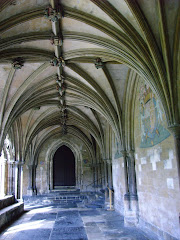Have you ever pulled out something from your garden that later turned out to be a good plant not a weed? There is a little flower and shrub garden on the office side of the church. My first summer here, I saw something that looked weed-like and began to pick them out of the bed whenever I passed the office door. Later in the summer, however, I found out that these weedy looking things were actually flowers and I felt very dumb and somewhat guilty.
We might say this about some people as well. On a first impression some people may seem to be not our kind of people—we don’t like the way they laugh, or their dress, or whatever behavior and maybe they don’t go to church, or go to a church we don’t like. But if often, after we allow ourselves to get to know them, they turn out to be good friends. We may forget how we ostracized them.
Think about the Hebrew Jacob. Our first impressions of him are of the person who cheated his brother out of his inheritance, and the fact that his mother Rabekah played favorites with him over his brother Esau, which makes us wonder about the integrity of his family. But in today’s reading we hear of Jacob being chosen by God to an instrument for the blessing of the Israelites. God sees the potential even in broken human beings, goes beyond the sins and uses the talents and gifts for God’s purposes.
God gives human beings not only second, but third and fourth and multiple chances. We mess up, we act totally dumb, we make bad choices, and the good thing is that God forgives our mistakes and gives us the opportunity to act for the good, to be instruments for God’s purposes.
So you may think of the field of wheat with its weeds today not as different people who are either the goodness of wheat which gives us bread and nourishment or weeds which steal the soil from the wheat and give nothing in return. Instead what if we thought of the field as ourselves, containing both wheat and weeds? People are never either all bad or all good. Humans are a complex mix of patience and impatience, of humility and pride, of kindness and meanness. In fact, most of our good fiction and movies play on this theme. Even heroes like Harry Potter carry some seeds of destruction and violence within them. Saint Peter, the rock of the church, denied knowing Christ. Dr. Martin Luther King, Jr. had behavioral issues that when they came to light made us know he had human foibles. There is no human being who is a clean field of wheat without weeds.
Think about what it takes to make a field without weeds—lots of herbicidal chemicals that pollute the water table of our farmland. To be totally without our darkness is only to deny that it exists. When denying that darkness exists is when the darkness can have the most power over human beings. In the holocaust, many Germans denied the existence of the concentration camps and refused to believe what was happening there. When those with addictions refuse to own up to their slavery, then they cannot be healed. If a person cannot see their faults, they cannot begin to tackle them, and the faults grow.
The psalmist knows that God has searched him out and known him. I believe that this can mean that God knows our faults, knows the weeds that try to choke out our wheat. Search me out and know my weeds, you might pray to God, for it is acknowledging those weeds before God that you can know the gift of forgiveness, and begin to heal.
To know that there is nowhere we can go that God is not there is to know that God loves our wheat field even as it is infested with weeds. God knows our troubles, the things and people that challenge us, the times when we think and do things not worthy of us, the hurts we harbor, the scars and grief that prevent us from growing into a strong field. And God gives our field a chance to handle those hurts without judgment. God is alongside to comfort, give us courage in the face of our troubles, to heal our wounds and make us whole. Our field of wheat and weeds is allowed to grow to fullness, to see which of those things that look like weeds are actually wheat, and to allow the goodness of the nurturing wheat to choke out the weeds along the way.
It’s when I know I am loved and cared for in spite of and because of my wounds, that then I can forgive others their wounds and hurts too. When we see each other as fields of mixed wheat and weeds, and see people as full human beings, not either fully good or bad, we see that this mixture is for God to judge not us and that God can redeem any situation, any person, for God’s purposes to further the kingdom of peace and justice.
God, search me out, know my weeds and my wheat and help me grow into a nurturing human being you want me to be.


No comments:
Post a Comment